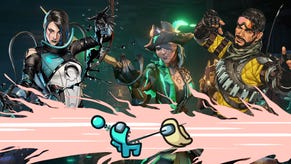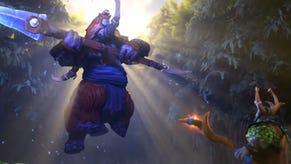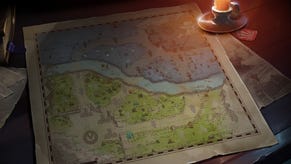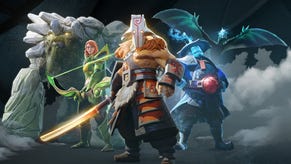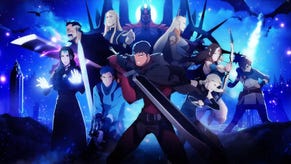Dota 2: An Electric Valhalla, Pt. 1
This Cannot Be Overstated
Quinns has lost himself in Dota 2 as if it were a Minecraft cave system. Surfacing 90 hours later, we asked him what Dota 2 means. This is what he sent us.
For the last few months, Dota 2's been wrestling with Team Fortress 2 for the title belt of most popular game on Steam. But really, the fight that hasn't even begun, and when it does, it'll be over in hours.
Today, Dota 2's little more than an embryo. It's a feature-incomplete beta, behind a paywall, without so much as a tutorial. When Valve flip that mad scientist-looking wall switch that gifts the finished, free-to-play Dota 2 to everybody with Steam, this game's going to go supernova. It's no joke to say it'll become the biggest thing on the PC.

The greater Rock, Paper, Shotgun Community collectively raised its eyebrows when Valve began work on a sequel to Dota. As individuals, we should now take those doubts and put them in that battered shoebox labelled "IDIOCY ETC".
Like hundreds of thousands of others, I'm addicted to Dota 2. It's the first multiplayer game I've ever taken seriously, the first free-to-play game I've ever spent money on, and I've already lost more hours to it than every Mass Effect game put together. Gabe Newell has allegedly played more than 2,000 hours, which is a nice number, because it's roughly how long a human will spend at an office job in one year.
You could swear off all us Dota 2 players as victims of some mass hysteria, of course. Ignore us, and just wait for the craze to blow over. Go home. Fix dinner, make love to your partner. But can you afford to take the chance?
Assuming your answer to that question is a fearful gulp and a resigned shake of your head, the following three articles will cover what Dota 2 means for gaming. For what the game actually is and why it's fun, I'd point you towards my Eurogamer diaries, which critics across the internet are calling "pretty good". They run along these lines:
This started in a pub. Of course it did. I remember agreeing to something about Dota 2 between a fourth and fifth pint of foamy lager.
The next morning I woke up to an email. It sat heavily in my inbox, like a gauntlet.
"Hello one and all,
"You've all expressed some interest in being part of an elite strike team attempting to learn Dota 2 and then actually beat some REAL PEOPLE at it. It's going to be difficult. It's going to be long. But it's going to be fun."
Are you in?"
Was I in? I was hungover. I felt like a dog raised on petrol station sandwiches. I felt like an obese kid who'd just been pushed backwards off a high diving board.

But here was a chance to do gamers a service. I could find out how long it takes to get competent at Dota 2, one of the least accessible games in existence, and tell people whether it's worth it.
tl;dr: It was worth it.
So, what does Dota 2 mean? Well, we begin with this.
Dota 2's Design Is Fucking Weird
Or maybe:
Dota 2 Is An Evolutionary Mutant
This cannot be overstated, both because it's the reason for Dota 2's success, and this weirdness has no end. To look at Dota 2 from a design perspective is like being hospitalised and seeing yourself in a mirror for the first time in a month. An overpowering familiarity, but hidden behind something lost, gorgeous and alien.
Let's start with this: Dota 2 has one level.
I don't mean it has one generic arena. Dota 2's one level is ruthlessly abstruse. After 90 hours, I still couldn't draw it accurately on a piece of paper. Within its asymmetric design are large bases, forests, roads, a river, cliffs and hills. Not only does it have shops, it has secret shops and side shops, and not only that, it's so big that each team gets a courier to deliver their purchases. In fact, it's so big that your team will have discussions over the order in which you'll have stuff delivered.
But yeah. There's exactly one field of battle for you to fight over, and whenever that fight ends - with glory, fury or shame - the land and combatants are restored for the next fight. It's no more, or less, than an electric Valhalla.
Now, I want you to imagine a commercial game designer deciding to create a triple-A, action multiplayer game that has just one map. It's counter-intuitive to the degree that they would never, ever go ahead with it.

(I say this knowing that some Pliny of a commenter is going to read that, their face will turn the colour of pizza sauce and they'll immediately start typing exceptions in the comments, but hopefully the rest of you will get the point I'm trying to make here.)
All of Dota 2 is like this. Dota's beginnings as a mod allowed it to evolve slowly, with years of passionate whimsy and expansive experimentation. The end result is mad stuff like Dota only having that one, perfect, map, or players being expected to slaughter their own armies to deny the other team the gold, or the concept of Carries, who are heroes who are radically underpowered when the game begins, and become overpowered by the end.
Some people don't quite get how odd it is to play Dota. How much you need to both learn and forget. I've seen them palm off the above hyperbaton by calling Dota a simple blend of RPG, RTS and tower defense, which is technically accurate in the same way that Wikipedia can tell you that dancing is just moving you body rhythmically. It's not wrong, but when it comes to performing, you're going to look like a prick.

The first thing you actually have to do with a Dota 2 noob is to tell them to stop playing it like an RTS, RPG or tower defense game. Because despite using familiar mechanics, it plays nothing like any of those games.
You get noobs to stop attacking defenseless enemies because they don't necessarily want to push a lane, and you teach them entirely new concepts, like XP radiuses and denying. And in doing this, you actually teach them an entirely new genre, a genre that's obviously been adapted and, in some ways, simplified by the moba-alikes that came after Dota.
What this teaches us is the same heartening message we learned from Minecraft and Day Z: there can be tremendous commercial success within wholly new ideas.

But unlike Minecraft and Day Z, Dota's design could never have surfaced from a commercial games development studio. Mostly, game development studios adhere to genre conventions, and we consider ourselves lucky when they work with no care for genre at all. But what they categorically do not do is go against people's insticts. Nobody's going to make a multiplayer game with one map, that takes an hour to play, that looks like an RTS but will fuck you if you try and play it like one.
Which is to say, it looks like Dota 2's about to become the most popular game on PC. And it couldn't have come from a professional games studio. That speaks of a strange inadequacy within commercial game design. But that's not actually the depressing part.
As you read these words, a dozen professional studios around the world are racing to emulate Dota's success. What's going to be truly depressing is if of all the contenders in the brand-new moba genre, Valve's curator-like porting of Dota 2 into the Source engine remains the most popular one. Not only could our games industry not have had this idea, they can't even improve on it.
Which, for my money, is exactly what's going to happen.

Mostly, what the success of Dota 2 means is (ARE YOU READY FOR THIS IS) what it means is to do with (NO WAY YOU ARE READY) it's to do with (GET READY) its success it to do with maximalism. Much like how Demon's Souls got everybody whispering about how gamers could - gasp! - react with glee to a bastard-hard game, one of the things we can learn from Dota 2 is that gamers aren't just willing to learn something preposterously big and complicated, they actively enjoy it.
While this generation of game design has seen the gradual simplification of drop-in, drop-out multiplayer, Dota 2 demands its players sit down and fight for up to 70 minutes. As other multiplayer games worry about being intuitive, Dota 2 lets its community bicker over how to play the game, and scream at anyone who can't figure it out. And then, of course, there are the playable characters. You get 108 heroes in Dota, any one of whom gets six item slots that can hold any one of 140 items (which, in turn, can be consumed, activated or used as components for other items).
All of which is part of the appeal. Discussing this stuff is the same as EVE pilots arguing about ship loadouts, or foot-to-ball fans pontificating on what kick is best to ensure a goal point.
Dota 2 isn't a good game that's a bit complicated, as developers around the world seem to think. To the Dota 2 community, the game's depth and its entertainment value is one and the same. It's not like they're sat around bitching about how many items they get to pick from. Yet every single moba I know of that's currently in development is trying to "correct" Dota's single, big flaw by making something less demanding.
So! In summary, before we progress. What does Dota 2 mean?
Well, the bad news is, there's something profoundly shambolic that what's soon to be the most popular game on Steam, and probably the PC, couldn't have been designed by the people whose job it is to make popular games.

The good news is, Dota 2 is more than just evidence that people enjoy different ideas. It's evidence that even farcically complicated games aren't beyond commercial success. I'd actually rather point at Dota 2 than Minecraft as proof that gamers don't just want to be spoon fed another Call of Duty. Almost anyone can fire up Minecraft and gasp as they find a waterfall with a pig in it or whatever. Actively hunting out Dota 2 and bypassing its thorny husk to squeeze some fun from it speaks of a desperation for inventive design. We are HUNGRY. We are not getting what we WANT. We are feeding OURSELVES.
...the other bit of bad news is that the games industry at large appears to be missing this point. People see Dota 2's invention of a genre as some gold rush to be exploited. And they're not wrong, necessarily. But it misses the other, noisier point. The degree to which people love Dota for its complexity.
Speaking of degrees, in pt. 2 we’ll look at this secret weapon of Dota 2. The real reason people will sink hundreds of hours into it like coins into an arcade machine. It’s because you never stop learning.


